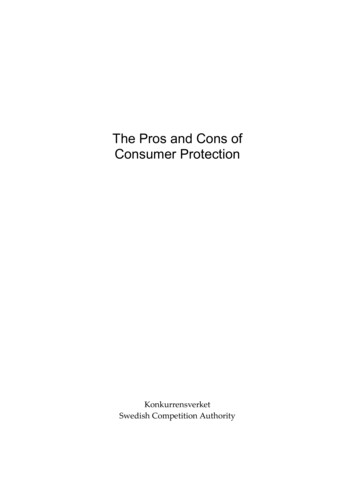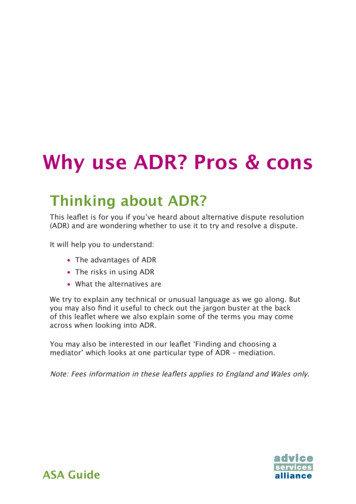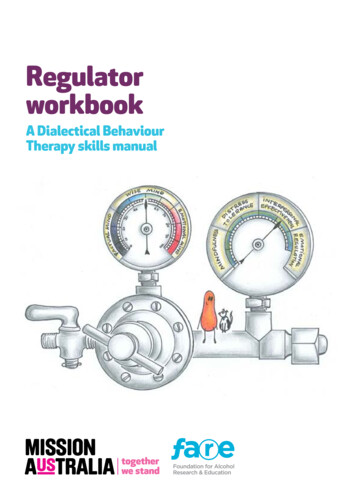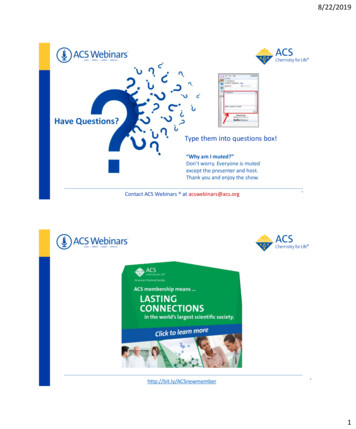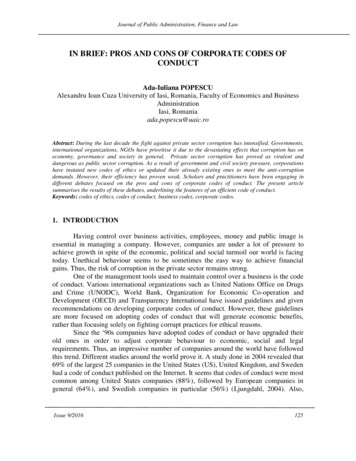
Transcription
Journal of Public Administration, Finance and LawIN BRIEF: PROS AND CONS OF CORPORATE CODES OFCONDUCTAda-Iuliana POPESCUAlexandru Ioan Cuza University of Iasi, Romania, Faculty of Economics and BusinessAdministrationIasi, Romaniaada.popescu@uaic.roAbstract: During the last decade the fight against private sector corruption has intensified. Governments,international organizations, NGOs have prioritise it due to the devastating effects that corruption has oneconomy, governance and society in general. Private sector corruption has proved as virulent anddangerous as public sector corruption. As a result of government and civil society pressure, corporationshave instated new codes of ethics or updated their already existing ones to meet the anti-corruptiondemands. However, their efficiency has proven weak. Scholars and practitioners have been engaging indifferent debates focused on the pros and cons of corporate codes of conduct. The present articlesummarises the results of these debates, underlining the features of an efficient code of conduct.Keywords: codes of ethics, codes of conduct, business codes, corporate codes.1. INTRODUCTIONHaving control over business activities, employees, money and public image isessential in managing a company. However, companies are under a lot of pressure toachieve growth in spite of the economic, political and social turmoil our world is facingtoday. Unethical behaviour seems to be sometimes the easy way to achieve financialgains. Thus, the risk of corruption in the private sector remains strong.One of the management tools used to maintain control over a business is the codeof conduct. Various international organizations such as United Nations Office on Drugsand Crime (UNODC), World Bank, Organization for Economic Co-operation andDevelopment (OECD) and Transparency International have issued guidelines and givenrecommendations on developing corporate codes of conduct. However, these guidelinesare more focused on adopting codes of conduct that will generate economic benefits,rather than focusing solely on fighting corrupt practices for ethical reasons.Since the ‘90s companies have adopted codes of conduct or have upgraded theirold ones in order to adjust corporate behaviour to economic, social and legalrequirements. Thus, an impressive number of companies around the world have followedthis trend. Different studies around the world prove it. A study done in 2004 revealed that69% of the largest 25 companies in the United States (US), United Kingdom, and Swedenhad a code of conduct published on the Internet. It seems that codes of conduct were mostcommon among United States companies (88%), followed by European companies ingeneral (64%), and Swedish companies in particular (56%) (Ljungdahl, 2004). Also,Issue 9/2016125
Journal of Public Administration, Finance and Lawmultinational corporations operating in emerging economies such as BRICs’ countrieshave been adopted codes of ethics. For example, 189 companies out of 500 companiesoperating in Brazil have adopted codes of conduct (Ardichvili, 2013).Codes of conduct are relatively new. Their history can be traced back to theUnited States in the 1950s and then in the 1970s, when American parent companies havedeveloped such codes for their subsidiaries operating in Europe.However, the name and content of codes of conduct varies from company tocompany, according to their size, organisational culture, operating business environment,their specific business activity and their commitment to follow business ethics. A code ofconduct has been described as “a written, formal document consisting of moral standardsand guidelines intended to help guide employee or corporate behavior” (Giorgini, p.1,2015; Schwartz, 2002). Different synonyms such as code of ethics, business code, codeof practices, business principles, code of business conduct etc. are used to describe the setof conduct rules that companies operate under. However, their different names havesometimes produced confusion in the literature.The concept of corporate code of conduct has suffered an evolution triggered bychanging social and economic needs. Thus, in the 1950s codes of conduct were merelydescribing the company mission, values and goals, giving directions to employees inorder to serve the company interest and increase its profits. Today, corporate rules ofconduct are also oriented towards the public needs, emphasizing corporate responsibilitywhen it comes to serve public economic and social goals.However, the content and the focus of codes vary greatly around the world,influenced by the continental business culture that companies have been created and/oroperate in. For example, United States companies are favoring codes of conduct whileEuropean companies do not. This is due to United States long tradition of corporate codesof ethics. Also, US codes are focused more on rules regarding employees’ behavior thatensure fairness and equity, while the European codes are emphasizing the generalbusiness principles and the relationship the company develops with the stakeholders(Kaptein, 2004). Also, at the European level, codes of conduct rules vary. For instance,French companies’ codes are enforcing rules that concentrate more on customer relationsand just as British companies’ codes do, they are emphasizing the idea of commonresponsibility of all employees in spite of their position in the company. Germancompanies’ codes are focused on the idea of shared responsibility between managementand the rest of the employees (Langlois and Schlegelmilch, 1990). In comparison, UScorporate codes of conduct seem better harmonised than the European ones.It is obvious that companies are developing codes of conduct for different reasonsand under different circumstances, making their assessment difficult. Thus, the necessityand efficiency of such codes might not be always clear, generating debates andcontroversies.2. THE PROS OF CODES OF CONDUCTDuring the last decade, codes of conduct have been mostly voluntarily adopted bycompanies that are trying to protect their interests and, also, in some cases, the publicIssue 9/2016126
Journal of Public Administration, Finance and Lawinterest. Thus, having a code of ethics has become the rule in corporate culture. However,how well these codes serve companies goals and public interest alike needs to be seen.Pros and cons have been outlined by business community, civil society, academiarepresentatives and different NGOs representatives.The reasons companies develop codes of conduct are many and different,illustrating their business conduct policy: to respond to consumer pressure and socialconcerns, to avoid negative media, to improve and protect corporate reputation byemphasizing corporate social responsibility and community involvement, to limitnegative externalities, and to actually provide for the public good. At the same time,codes of conduct can be an effective tool against corporate corruption by keeping undercontrol employees’ behaviour in order to prevent wrongdoing that could have social andeconomic adverse effects.Thus, codes of conduct can be useful for the corporation, its stakeholders, and thecommunity that bears the effects of corporation activity.Empirical studies show that codes of conduct will help cement a corporation’sgood reputation, improve the working climate inside a corporation and its businessperformance (Kaptein & Schwartz, 2008). At the same time, the rules of conduct willprevent unethical and illegal wrongdoing, making employees’ behaviour morepredictable.As studies show, the main reason companies develop codes of conduct is to selfprotect themselves, usually preventing conflict of interests at company level (Stevens,1994). Also, a code of conduct may be used as evidence in a criminal case to show thatan employee had knowledge of a prohibited activity or action and the company was proactive in preventing it. Main sanctions for the employees that are breaking conduct rulesare: termination, suspension, demotion, probation, appraisal comments, and otherpenalties.In recent years, codes of conduct have become part of governmental complianceprogrammes that target illegal behaviour and aim to ensure fair market competition. Forexample, companies have voluntarily adopted such codes as a result of stronggovernmental legal actions aimed at curbing private sector corruption. Usually,companies prefer self-enforcement rather than governmental one, the last beingdisruptive to business. United States Foreign Corrupt Practices Act (FCPA) strongerenforcement had such an effect on US companies.Another advantage of codes of conduct is the fact that these tools can be adjustedto a company’s needs. Companies can enforce rules meant to prevent and sanction firsthand illegal and/or immoral employees’ behaviour that is sometimes hard to detect, suchas corruption.At the same time, codes of conduct can increase profitability and generate higherfinancial gains for the company and its employees. Codes could sustain the success of acompany and also of the local economy, in general. This is a natural effect that ethicshave, since people do business with other people they trust. A recent survey on corporatecorruption in Europe, the Middle East, and Africa shows that growth and ethics is amatch, since respondents who reported revenue growth in their business were having acode of conduct in place that reflected ethic policy, state penalties for wrongdoing andIssue 9/2016127
Journal of Public Administration, Finance and Lawdeliver training and support for whistleblowers that report corruption and fraud (Ernest &Young, 2015). Also, indirectly, the positive effect of codes of conduct on the success of abusiness reflects as well on people willingness to work for such a corporation and also oninvestor’s loyalty and on customer satisfaction.Companies that follow business ethics are helping their employees work better.The ethical environment makes employees feel appreciated and secure, knowing thathonest and ethical conduct is the norm and any violation can be promptly reported to theappropriated person indicated by the code.In some cases, codes of conduct generate a “clean” marketing image for acompany. Investors could be attracted not only by financial growth but also, by themoral, ethical driven business activity that a company performs. Also, customers prefersometimes to buy certain products not only for their quality or their good price, but alsoknowing that these come from a company that conducts an ethical business activity.Overall, there is no doubt that codes of conduct could serve both the private andpublic interest. However, not always their efficiency prevails.3. THE CONS OF CODES OF CONDUCTThe existence and the use of corporate codes of conduct have been under scrutinyand critiques have been raised due to the corporate scandals that in recent years haveaugmented. These companies had codes of ethics but they have chosen to ignore them.Arguments against codes of conduct come both from the public but also from thebusiness representatives as well.Codes of conduct proved inefficient since massive scandals such as Enronaccounting scandal or Volkswagen emission scandals occurred.It seems that codes have been developed as a mere response to public andgovernmental pressure on corporate social responsibility, generating a trend. In reality,the public believes that ethics are just ignored by corporations and codes are often used asa marketing tool, attracting customers’ and investors’ sympathy and thus, promoting thebusiness on ethical grounds.Codes of conduct are not binding by nature; they are just stating internal rules thathave to be followed by employees. How well these rules are obeyed remains a matter ofinternal control and sanctioning since there is no “ethics police”, external to the company.Thus, if the company does not encourage its employees to respect rules of conduct andefficiently monitor it, then they remain futile (Baker, 2007).Other criticism focuses on the broad, vague language of the codes, especiallywhen it comes to stating the rights of the employees and explaining the mechanism usedby the company for self-evaluation. As a result, codes are not specific enough in order toshape moral behaviour and to sanction misconduct. At the same time, codes could beused against employees, containing provisions that limit their freedom to speak out andunveil unethical behaviour for fear of retaliation. In short, the content of codes variesgreatly since corporations usually ignore international standards when they draft theirrules of conduct. This makes their worldwide enforcement difficult, if not impossible.Issue 9/2016128
Journal of Public Administration, Finance and LawCodes of conduct should address all employees, not only top management, sinceethics concerns the company as a whole. Also, the codes that use a top-down approachproved to fail for a number of reasons. For instance, moral principles and rules areignored by management at investors’ pressure. It is the case of Enron management thatchoose to ignore the code, serving its interest. Thus, unless there is commitment from allemployees, no matter their rank, to implement and respect rules of conduct, codes remainuseless.From a corporate perspective, codes of conduct could also present somedisadvantages. Drafting and implementing rules of conduct is usually seen as expensiveand time consuming on a short-term. These add to “dangerous”, since companies exposethemselves to litigations if they fail to follow their own written rules of conduct. Codes ofconduct could reveal corruption problems that companies want to hide. Making thempublic will generate bad publicity and the loss of financial profits obtained by engaging incorruption activities.Also, corporations operating worldwide could be exposed to different conflicts ofinterest due to incongruence between their codes of conduct and national laws of thecountries they operate in, especially when it comes to human rights issues (Kokemuller,2015).Corporations do not have enough incentives to adopt codes of conduct.International provisions and national laws offer little or no protection to companies thatfollow ethics Thus, while UNODC, World Bank, OECD members and the United Statesin particular have urged corporations to adopt a common code of conduct, they have beenresistant to do so due to the disadvantage it would place them at in the business worldwith other countries who do not commit to ethical practices (Torsello & Venard, 2015).In spite of the many arguments raised, it seems that the efficiency of codes ofconduct in curbing unethical behaviour lies with its integration in the corporate cultureand with its optimum communication to the employees.CONCLUSIONThe fight against unethical, corrupt behaviour has become one of the present daysocial challenges. Society expects integrity, transparency, accountability, professionalismand efficiency from both, public and private actors. As a result, the corporate codes ofconduct need to better reflect the present dimensions of corporate responsibility in terms ofeconomic, social and legal requirements, serving both the public and corporate needs.Codes’ efficiency has been under constant scrutiny. Scholars and practitioners alike haveraised arguments for and against the adoption of written rules of conduct. This proves that creating aculture where ethics rule is a challenging endeavour. However, if codes of conduct will be draftedaccording to common international standards and their existence will be mandatory for allcorporations around the world, then codes of conduct will become a long-term investment thatcould help curb corruption and bring economic and social benefits.Issue 9/2016129
Journal of Public Administration, Finance and LawReferences[1] Ljungdahl, Fredrik (2004). “The ‘Transatlantic Divide’: A Survey of European versus U.S. CorporateCodes of Conduct”. Retrieved at http://www.snee.org/filer/papers/242.pdf.[2] Ardichvili, Alexandre et al. (2013), “Building Ethical Business Cultures: BRIC by BRIC”. Retrieved athttp://www.europeanbusinessreview.com/?p 1930.[3] Giorgini, Vincent et al. (2015). “Researcher Perceptions of Ethical Guidelines and Codes of Conduct”.Retrieved at 3/. 3[4] Schwartz, Mark S. (2002). “A Code of Ethics for Corporate Code of Ethics”, Journal of BusinessEthics, no. 41(1–2), pp. 27–43.[5] Kaptein, Muel and Schwartz, Mark. (2004). “Business Codes of Multinational Firms: What Do TheySay?”, Journal of Business Ethics, no. 50, pp. 13–31.[6] Langlois, Catherine C. and Schlegelmilch, Bodo, B. (1990). “Do Corporate Codes of Ethics ReflectNational Character? Evidence from Europe and the United States”, Journal of International BusinessStudies, vol. 21, no.4, pp. 519-539.[7] Kaptein, Muel and Schwartz, Mark. (2008). “The Effectiveness of Business Codes: A CriticalExamination of Existing Studies and the Development of an Integrated Research Model”, 77 Journalof Business Ethics, no.77, pp. 111-127.[8] Stevens, Betsy. (1994). An Analysis of Corporate Ethical Code Studies: "Where Do We Go FromHere?", Journal of Business Ethics, no. 13(1), pp. 63-69.Retrieved 2027.42/42514/10551 2004 Article BF00877156.pdf?sequence 1&isAllowed y.[9] Ernst & Young. (2015). Fraud and Corruption – The Easy Option for Growth? Europe, Middle East,and Africa Fraud Survey. Retrieved at fraudsurvey/ FILE/ey-emeia-fraud-survey.pdf.[10] Baker, Mark B. (2007). “Promises and Platitudes: Toward A New 21st Century Paradigm forCorporate Codes of Conduct”, Connecticut Journal of International Law, vol. 23, pp.123-163.[11] Kokemuller, Neil. (2015). “The Disadvantages of a Code of Conduct”. Retrieved athttp://www.ehow.com/list 7393499 disadvantages-code-conduct.html.[12] Torsello Davide and Venard, Bertrand. (2015). “The Anthropology of Corruption”, Journal ofManagement Inquiry, vol. 25(1), pp. 34-54.Issue 9/2016130
Pros and cons have been outlined by business community, civil society, academia representatives and different NGOs representatives. The reasons companies develop codes of conduct are many and different, illustrating their business conduct policy: to respond to consumer pressure and social concerns, to avoid negative media, to improve and .

